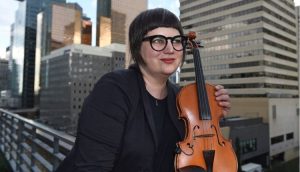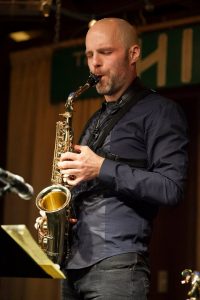Virtual Visionaries Week 2: “Forging New Paths”
June 5, 2020 In: PRJC News, Sound BitsThe University of Michigan EXCEL Lab, in collaboration with the Eastman School of Music’s Institute for Music Leadership and a cohort of seven co-sponsors recently completed week two of the Virtual Visionaries series.
The guests for week two were Tanya Kalmanovitch and Ryan Muncy. Both artists are active
 and engaged in the New York City music scene and serve on the faculty of the New School’s College of Performing Arts. A Canadian born violist, ethnomusicologist, and author, Kalmanovitch has been named “Best New Talent” by All About Jazz and in 2018 was named one of 50 Grist Fixers, a cohort of diverse innovators with bold solutions to humanity’s biggest challenges. Muncy is currently saxophonist with the International Contemporary Ensemble. He is the recipient of the Kranichstein Music Prize, a Fulbright Fellowship, and the Eddes Foundation Prize for Emerging Artists. Muncy and Kalmanovitch are regular collaborators and most recently co-taught The Entrepreneurial Musician at the New School.
and engaged in the New York City music scene and serve on the faculty of the New School’s College of Performing Arts. A Canadian born violist, ethnomusicologist, and author, Kalmanovitch has been named “Best New Talent” by All About Jazz and in 2018 was named one of 50 Grist Fixers, a cohort of diverse innovators with bold solutions to humanity’s biggest challenges. Muncy is currently saxophonist with the International Contemporary Ensemble. He is the recipient of the Kranichstein Music Prize, a Fulbright Fellowship, and the Eddes Foundation Prize for Emerging Artists. Muncy and Kalmanovitch are regular collaborators and most recently co-taught The Entrepreneurial Musician at the New School.
 The blog-post that Muncy and Kalmanovitch co-authored was titled “Forging New Paths.” While the blog and Zoom discussion were originally intended to focus exclusively on how artists can respond and adapt in the age of COVID-19, the focus expanded in response to the death of George Floyd, inequality, and systematic racism. In both their blog and subsequent video session, Muncy and Kalmanovitch articulated so effectively their perspective on the moment we are in and the work that needs to be done. A section of the blog post that was particularly compelling was when Muncy stated:
The blog-post that Muncy and Kalmanovitch co-authored was titled “Forging New Paths.” While the blog and Zoom discussion were originally intended to focus exclusively on how artists can respond and adapt in the age of COVID-19, the focus expanded in response to the death of George Floyd, inequality, and systematic racism. In both their blog and subsequent video session, Muncy and Kalmanovitch articulated so effectively their perspective on the moment we are in and the work that needs to be done. A section of the blog post that was particularly compelling was when Muncy stated:
What we can do is spend more time listening, watching, and trying to understand the world around us while it changes so quickly. We can use this opportunity to imagine a world we want to live in. We, as artists, can use this opportunity to imagine the arts ecosystem we want to participate and work in. We can imagine a future of our artform that is less racist and more inclusive.
Muncy was candid in sharing a realization he had this past March that we were training and preparing for a world that no-longer existed. He spoke about the opportunity we have to reimagine and shape what the world will look like when we emerge from these various crises. Kalmanovitch echoed Muncy’s sentiment as she focused on the question of “What If?” She shared with the group poignant text from Adrienne Rich:
Any truly revolutionary art is an alchemy through which waste, greed, brutality, frozen indifference, “blind sorrow,” and anger are transmuted into some drenching recognition of the What if?–the possible; What if?–The first revolutionary question, the question the dying forces don’t know how to ask.
The big picture question of “what if?” and the concept of ‘reimagining’ was paired with practical guidance and insight for how individual artists and arts organizations can enact meaningful change within our profession and the world as whole. Kalmanovitch, reflecting on the impact of the global pandemic and systematic racism in our field, remarked: “how do we dismantle our possessive investment in whiteness, while simultaneously advocating for the advancement and survival of our work?” She encourages us to “recognize the truth of your perspective if you see things differently from the status-quo.” Muncy encourages us to be “honest and direct with areas we can make improvements in and to turn external messaging into internal action.” According to Kalmanovitch, this action is also connected to understanding oneself as an artist:
Knitting together and stitching together all of the things that I am and all of the things that I have to offer to the world and then figuring out . . . you take all of the natural skills and inclinations and personality traits that you have – musical or non-musical—and you figure out how to name those things and know those things in yourself. It is a miracle when you figure out where you can best serve people with that.”
The questions posed by Muncy and Kalmanovitch are questions that every artist, ensemble, and arts organization should be grappling with and provided a powerful and honest assessment of the role the arts will play for future generations.
Learn More
- Watch a performance of Kalmanovitch’s The Tar Sands Songbook
- Eastman Case Studies Case Pack: Mission & Opportunity
- Learn more about SMART Goals
- Read more of Adrienne Rich’s Poetry
UP NEXT: Virtual Visionaries: Running an Arts Org
Blog Post: Monday, June 8
Virtual Session: Wednesday, June 10th from 4-5pm EDT
PRJC Summary: Saturday, 13th at 10am
Zoom Link for the Virtual Session: http://myumi.ch/O42Oq
Join Matt and Kari Landry, co-founders of Akropolis Reed Quintet, and Julie Nakagawa, Artistic Director of DanceWorks Chicago, as they share experiences building these vibrant organizations from the ground up. This conversation will explore some of the key challenges they have overcome, and share insights for sustaining enterprises beyond volatile circumstances.
Virtual Visionaries is a 10-week series in partnership between UM’s EXCEL program, Eastman’s Institute for Music Leadership, and seven other national partners. Starting the week of May 25 through early August, this series brings together professionals across the performing arts for weekly virtual discussions on Zoom. We’ve selected a diverse group of leaders at various stages of their careers to engage in open conversations about topics ranging from personal finance issues, to developing identity-driven work, along with a variety of entrepreneurial approaches relevant to young arts professionals. Each week our guest speakers will also author a blog post, providing a sneak peek of the virtual sessions and providing a basis for our virtual discussion.
The series co-sponsors include:
Eastman School of Music’s Institute for Music Leadership
Manhattan School of Music’s Center for Music Entrepreneurship
Michigan State University’s Running Start Program
New England Conservatory’s Entrepreneurial Musicianship Department
Roosevelt University’s Center for Arts Leadership, Chicago College of Performing Arts
University of Colorado-Boulder’s Entrepreneurship Center for Music
University of North Texas’ Music Business and Entrepreneurship Program
Wayne State University’s Music Business Program
